

The issues of immigration and workers’ rights are inextricably linked, as seen in the participation of 30 L.A. labor unions in today’s Citizenship Caravan to Bakersfield. The unions are joining organizations from all over California to call for immigration reform with a path to citizenship.
A less widely known example of this link is an obscure immigration program that is being used by irresponsible companies in ways probably not envisioned by the government. One of those companies is located here in Southern California and is locked in a labor dispute with its employees.
The EB-5 investor program connects wealthy immigrants with U.S. businesses seeking capital. Run by the U.S. Citizenship and Immigration Services agency (USCIS), its stated purpose is to “stimulate the U.S. economy through job creation and capital investment by foreign investors.”
In exchange for a million-dollar investment (only half a million if the business is located in a high-unemployment area) USCIS grants the investor a green card if they can prove that their investment created at least 10 jobs.


(Editor’s Note: On August 14, hundreds of cars from all corners of the state will travel in caravans to Bakersfield, California, to urge House Majority Whip Kevin McCarthy [R-Bakersfield] to support and advocate for a vote on immigration reform with a path to citizenship.)
Greyhound bus drivers took the initiative to share with their employer why comprehensive immigration reform is important for the community and posed a challenge to the company: Greyhound Bus Line could either keep up with the change or stay behind. The company recognized the importance of immigrants to their business and decided to embrace diversity through their full support of immigration reform.
A Greyhound van will be participating in the Citizenship Caravan to Bakersfield, August 14. Bus Drivers Leonard Weaver and Sindy Vasquez – members of the Amalgamated Transit Union, ATU Local 1700 – championed the immigration reform campaign at their workplace and are looking forward to the caravan.
» Read more about: Join the Immigration-Reform Caravan to Bakersfield! »


Cathy Ellorin has to fight for each and every hour of her job. In fact, she has to fight to convince the people who pay her that what she does is a job at all. It’s not as though she works short hours; actually, she gets no time off at all. Her job isn’t easy, either.
Cathy is currently employed as an in-home caretaker to her daughter Natalia, who has cerebral palsy. California State’s In-Home Supportive Services program (IHSS) provides Cathy with financial support to enable her to stay at home with Natalia and keep her safe and happy. But Cathy has to fight to keep this support coming.
From the first years of Natalia’s life, Cathy could tell something wasn’t right. Natalia’s tremors were disconcerting enough, but the daughter’s inability to feed properly was far worse.
Cathy took Natalia to Children’s Hospital in Los Angeles for a wide range of neurological testing,
» Read more about: The Job of a Lifetime: Caregiving for a Disabled Daughter »


Job growth is sputtering. So why, exactly, do regressive Republicans continue to say “no” to every idea for boosting it — even last [month’s] almost absurdly modest proposal by President Obama to combine corporate tax cuts with increased spending on roads and other public works?
It can’t be because Republicans don’t know what’s happening. The data are indisputable. July’s job growth of 162,000 jobs was the weakest in four months. The average workweek was the shortest in six months. The Bureau of Labor Statistics has also lowered its estimates of hiring during May and June.
It can’t be Republicans really believe further spending cuts will help. They’ve seen the effects of austerity economics on Europe. They know the study they relied on by Carmen Reinhart and Kenneth Rogoff has been debunked. They’re no longer even trying to make the case for austerity.
» Read more about: Republicans’ Economic Stance: Pray for Pain »
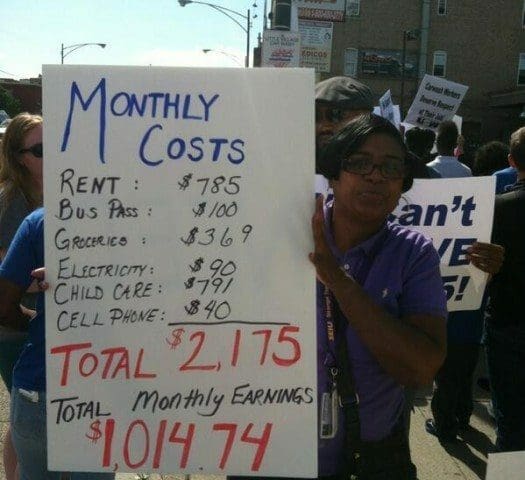
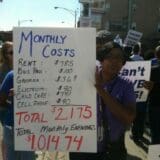
Something is happening among our low-wage workers in America.
Is the ghost of the Occupy movement stirring?
Probably, but maybe more. In just one astonishing week recently, the Seattle Times—a newspaper not known for being pro-labor—featured worker protests either as the lead story or prominently in the paper:
» Read more about: Behind the Stirring Among Low-Wage Workers »


Dear Brother,
In my job I use
a tiny torch
it opens and closes as I stitch
metal with a syringe of light
bright as a drop of sun. I try
not to look but two white spots
burn at the back of my eyes.
In one I see
the other jobs I’ve had –
cleaning up inn rooms
— someone else’s stain.
In the other: years
nearly starving on the farm
never enough, no wheels, no
way to town.
Between
these two spots the men
who wanted something and me
just trying to make it work.
Possession
implies something remains,
but want is all it is.
Dear Brother,
in little squeezes of light
that whisper and cut
are months and years my history
turned white
in this brazier that captures and holds,
this chamber
where everything
hardens and glows.
——————————————————–——————————————————–
Source: The Dos Passos Review,
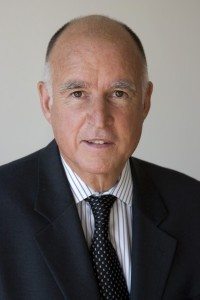
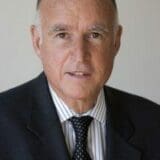
In 2008, Governor Arnold Schwarzenegger signed SB 375, the first piece of legislation in any state that tied transportation choices to greenhouse gas emissions and global warming. The legislation, authored by Senator Darrell Steinberg, required that planning regions create transportation plans that would reduce Greenhouse Gas emissions to 1990 levels by 2020.
As more and more regions adopt these plans, an obvious flaw is emerging. Plans are only as good as the money that exists to implement them. With funding scarce, many of these plans will likely gather dust.
Steinberg went back to work. His first piece of legislation to address this shortfall was vetoed by Governor Brown last year. Brown felt that the timing wasn’t right for legislation that gave municipalities the power to create agencies similar to the Community Redevelopment Agencies he had just ordered dismantled. That didn’t stop Steinberg from reintroducing similar legislation,
» Read more about: Will Jerry Brown OK Sustainable Development? »
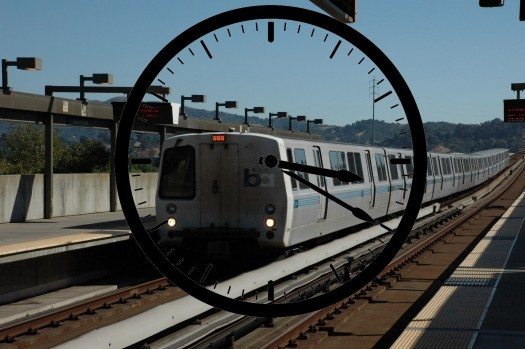

How did the BART dispute ever reach this point?
For several weeks now, BART [Bay Area Rapid Transit] management has mounted a sophisticated PR campaign, stating that its workers are overpaid and unreasonable. But its evidence on employee pay and benefits has been misleading at best; its estimates of average pay include many highly paid managers, thus exaggerating significantly the pay of frontline employees. Likewise, management’s statements on employee contributions to health benefits have failed to account for the significant out-of-pocket expenses incurred by many BART employees.
Denigrating your workers in the media may be a winning strategy in the battle for public opinion, but it’s a foolhardy one for senior management running an organization whose success depends so heavily on employee commitment and flexibility.
This week’s public hearing in Oakland before Governor Brown’s three-member investigative panel provided an entirely different version of events from BART’s media campaign.
» Read more about: Truth Gets Derailed in BART’s Media Campaign »


(Dave Zirin writes about sports and society for the Nation, where this post first appeared. Republished with permission.)
Sometimes it’s all just too damn much. First came word this week that the famed Coney Island statue of Jackie Robinson, standing alongside Pee Wee Reese as sporting symbols of racial progress, had been defaced, with “die n***ers,” “f*ck Jackie Robinson and all n***ers,” and “Heil Hitler” scrawled across it. It’s quite the capstone to a summer that started with the sweetly hopeful biopic, 42, about Robinson’s early career and post-racial promise. There is no doubt if Robinson still walked among us, he wouldn’t be shocked at the vandalism of his statue. He’d grit his teeth and set to cleaning it with his bare hands as a vein throbbed dangerously on his temple. This is the world—and the country—Jackie Robinson knew all too well.
» Read more about: Jackie Robinson, Trayvon Martin and the Ebony Boycott »
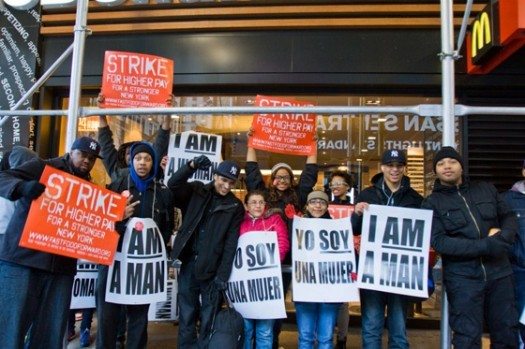
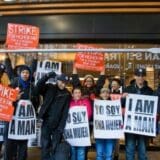
 Recent one-day strikes at McDonald’s and other fast food restaurants around the country grab the public’s attention and generate much more buzz than standard union/management contract disputes.
Recent one-day strikes at McDonald’s and other fast food restaurants around the country grab the public’s attention and generate much more buzz than standard union/management contract disputes.
Showcasing the personal struggle and courage of low-wage workers and the greedy companies which refuse to raise their pay, these “Fast Food Forward” protests sidestep traditional collective bargaining practices. But much of the funding and organizing talent comes directly from established national unions such as SEIU [Service Employees International Union].
Alt-labor campaigns portray a labor movement dedicated to building power among part-time, entry-level service workers and communicate a central message of organizing: That the only way to bring employers around is to stir up trouble.
Could Alt-Labor’s positive spin rub off on some of the labor movement’s other challenges, where public sympathy is in shorter supply? For example: unionized government workers facing upcoming pension battles in many cities and states.